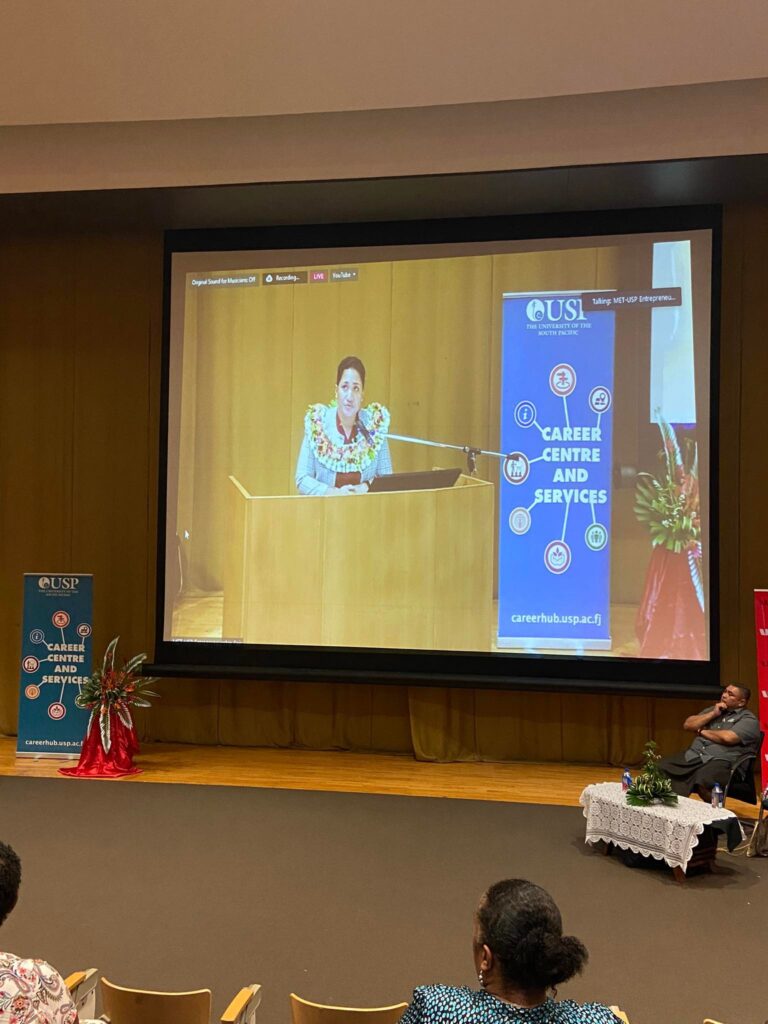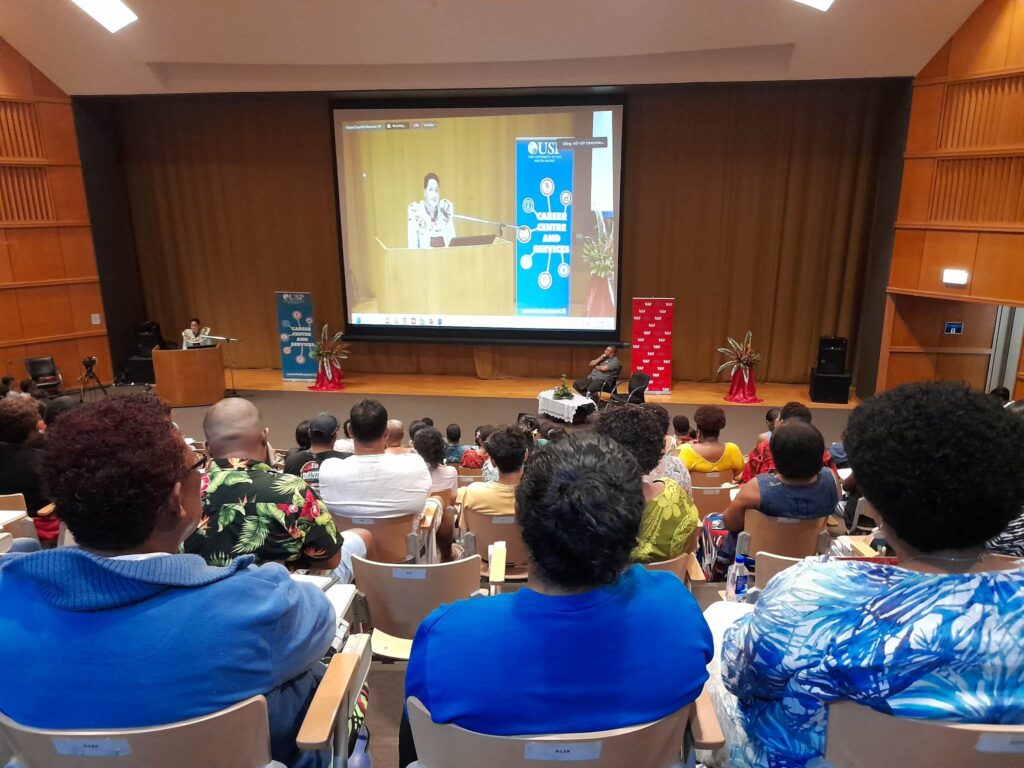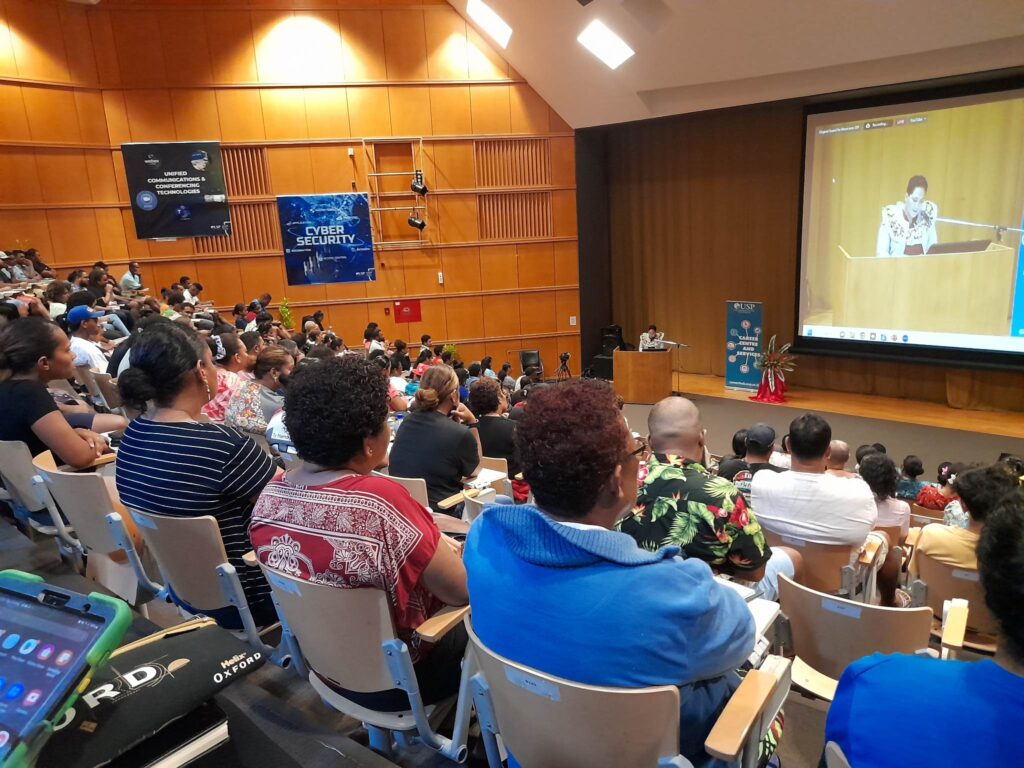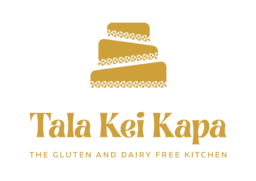
Source: Sala Lesuma
Chief Guest speech
Vice Chancellor and President, The University of the South Pacific, representatives from Senior Management, Heads of Schools, invited guests, students and sponsors ladies and gentlemen.
Malo e lelei, Noa’ia e mauri, Talofa, Talofa lava, Namaste, As Salamu Alaykum, Ni sa Bula Vinaka!
First of all I would like to express my gratitude to Professor Pal Ahluwalia and his colleagues for extending this invitation and giving me the opportunity to officiate as the Chief Guest in launching the USP Entrepreneurial Fair 2023 here at Laucala Campus. I am humbled to be here as chief guest, as an alumna, a former staff of the university, a fefine Tonga (Tongan woman), a full time mother and an entrepreneur.

I am aware that this event is open to the public as USP endeavours to disseminate as much information as possible, through its collaborative network and business development skills workshops to encourage and promote the establishment of small and medium businesses in the future. This is the university’s commitment to establish an entrepreneurial platform to address one of its key priority areas – creating entrepreneurial awareness for USP and the region in its 4 Years Strategic Plan of 2022 – 2024.
I believe that it is necessary that students and the public be given access to programs on entrepreneurial skills, to make them more enterprising in creating employment rather than waiting to be employed. Because the truth is, not every person graduating with a diploma or degree will be employed. After I graduated from the Tonga Institute of Education with a Diploma in Education in 2007, I was unemployed for 7 months waiting to be employed.
Universities and higher learning institutions must be at the forefront of small business development, because they have the potential to provide some of the best resources for small business development. Such as research facilities, testing of products, providing leadership and skills workshops in business and offering the best mentoring for successful entrepreneurs. This entrepreneurial fair of 2023 aims to enhance and solidify these ideas and also propel the University of the South Pacific to be an entrepreneurial university in the future.
This is an annual USP event which involves local and regional entrepreneurs and speakers. And it is a four day event with exciting and informative learning sessions. I have registered to be in every session this week, because there are so many things that I need to learn about doing business.
I have learned everything on the go through research, trial and error, online lectures, youtube videos, blogs, peer-reviewed articles and experience. And so, I am quite nervous and uncomfortable to address you all as I am aware there are many well established entrepreneurs, accountants and business people here. When we drove here, I told my husband I am so uncomfortable to be speaking as Chief Guest. But the more uncomfortable I am, the better. Growth happens when you are out of your comfort zone. I will only speak from my own experience as I have no qualification in business whatsoever.
When my husband and I started Tala kei Kapa in 2018, we had no business plan, goal, or vision. We just started selling gluten free and dairy free foods at the monthly Roc Market. Our beginning was like the Tongan way of giving directions in English, “you come to da mango tree, and go, goo, gooo, gooo”. It was my experiences in the UK that inspired me to manage our business more seriously. In the UK, I learned about the Natasha law which mandates UK food businesses to label allergens accurately. The law is in memory of a 15 year old girl who died from a severe sesame allergy after consuming a sandwich. I realised food allergies and food intolerances are a growing public health concern and I thought damn I need to be serious. Like someone can seriously die if I don’t be serious and that’s bad for me and bad for business. So, I began collecting and analysing customer data because food allergies and intolerances receive very little attention in Fiji and the Pacific. Yesterday I shared this event on our business page because I wanted my customers to know that I am going to talk about food allergies, food intolerances and start raising awareness. Now, we have tailored our business according to the Natasha law, ensuring all ingredients are safe and our product ingredients are clearly labelled for our customers. We now have a vision, goals and a strategic business plan.
This year’s entrepreneurial fair focuses on the theme of “Entrepreneurial Goals towards a Sustainable Environment.” This is an incredibly important topic that deserves our attention and efforts especially in a time where our society is filled with so much waste.
Now having a background in environmental studies operating a food business, I am aware of the amount of waste that we have generated. And I have thought about how to balance business success and sustainability. Entrepreneurial goals for a sustainable environment require balancing sustainability and customer demands, which can be challenging in the food industry. Many small food businesses struggle with the cost of sustainability, as it often leads to price increases that conflict with customers’ desire for cheap options. Our business faces similar challenges, using imported ingredients in plastic packaging because they declare the presence of food allergens. So, we have included a sustainability plan in our business strategy, setting goals to reduce our plastic waste. To achieve this, we have ventured into farming to grow our own ingredients, as a way to control the quality of our ingredients but most importantly reduce our plastic waste. Despite our lack of experience in farming, we are committed to learning and pursuing our vision. We have absolutely no experience in farming, but we aren’t phased, we will learn and we will grow our own ingredients organically and the traditional way.
From my own experience, there are six areas that I believe are important for entrepreneurial success.
- Education and training programs are crucial for successful businesses. They provide specific content with essential skills for business planning and financial management. Cost for training programs can be a significant barrier for small business owners, making some programs inaccessible. Open educational resources can help promote entrepreneurial skills in the region, and USP is leading the way in this regard.
- Many small businesses often lack capital and struggle to grow, but access to external funds can facilitate the growth of great business ideas. When individuals have access to training that teaches them necessary business skills, they will be in a better position to access and manage funds and grow their business.
- Mentorship and networking programs are great opportunities for entrepreneurs to learn from experienced entrepreneurs. This week is a great place for entrepreneurs to seek guidance, learn and build valuable relationships. But you can learn and network in any setting. Selling at Sunday market for me was my place to network. Besides marketing and selling, the market served as a learning opportunity for me to understand market preferences, gather and analyze data, and network with other vendors and the public. I don’t just go there to sell my product, I am there collecting data, I sit there with my notebook noting down what people bought, what they asked for, how much are they willing to spend etc. Through this, I’ve also learned about the struggles of small businesses trying to get their products into supermarkets. The big business people often are the ones blocking. There are so many imported products on the shelf but our local products have to climb a mountain and build a church in one day to get their products in.
Entrepreneurial events like this entrepreneurial fair can be a valuable network and learning experience for all entrepreneurs.
- Having a good regulatory environment will encourage business activities. Individuals are likely to be encouraged to start a business when there are far less bureaucratic barriers, tax incentives in place and business registration processes are streamlined. In the World Bank Ease of Doing Business rankings, New Zealand is ranked number 1 out of 190 countries. Fiji ranked 34 in 2006 and 102 in 2020 and is now 163. The process of starting a business here in Fiji is not easy and small businesses are often discouraged at the beginning of the business registration process. Many individuals and small businesses can benefit from monetizing their social media accounts from the content they create, but you can’t do that in Fiji.
- I believe in entrepreneurial drive and motivation. If people are to venture into business then individuals need to be encouraged to value their own ideas, be open to new ideas, to take risks, to do what they enjoy, think outside the box and have the ability to adapt. When an individual is creative, they have a higher chance of being innovative and creating something of value and relevant. The environment that we grow up in has a big impact in our sense of creativity. If we grow up hearing “what do you know, you were just born yesterday” “you’re uneducated, no qualification” “you come from the island, what do you know about business”, those words cripple creativity. Individuals need to be encouraged to value their ideas and use their imagination.
- Recognizing and celebrating successful entrepreneurs can help inspire others and create a culture that values entrepreneurship. This can include awards, competitions, and other forms of public recognition.
When you become an entrepreneur, your failures and successes are yours. You own your ideas and bring them to life and you get recognised for what you have accomplished! Tala kei Kapa is a small business with a big impact, catering for individuals with multiple food allergies and food intolerances. One of my regular customers is a young mother with a child that is autistic. He is intolerant to lactose and soy and is allergic to brown sugar and sweet fruits. These foods cause an escalation in his meltdowns. When there is a school event, she asks me to bake something for him so that he doesn’t feel left out. Often people look at us, people with food intolerances or food allergies as if we make it up or as if we are fiepalangi. No, our bodies cannot digest certain foods. I have catered for many clients with many food allergies and food intolerances. I tweak my recipes for them and I never tell them that I cannot help them, I operate with the concept of there is something for everyone. I have great problem solving skills and I use it to serve my customers. They tell me, they have this dietary requirement and ask if I can cater, I look at it as a problem that I need to solve. Today, as Chief Guest, I am being recognised as an entrepreneur but more importantly for being creative, for having empathy and for the quality of the goods and service I provide. I am grateful to be here and to be honest I have absolutely no desire to go back to being “employed”. I love what I do even if it pays me far less. My business is risky, one mistake can be fatal for a customer, but I love what I do. I am meticulous about my operating procedure. I have checklists. With my GIS background, I operate with a mindset that there are inputs, processes and outputs and I always ask myself “how can i be more efficient?, how can I do this better?”
Ladies and gentlemen my sermon has gone beyond the time given to me so I need to wrap this up. I’d like to say this, entrepreneurs are courageous people that take risks and embrace the unknown and this week is an opportunity to explore your options, learn and to network. I would like to encourage everyone here to make use of this opportunity. Finally, if you can get your hands on these books, I recommend reading them to help you refocus: 12 Rules of Life by Jordan Peterson, 12 Irrefutable Laws of Leadership by John Maxwell and Start with Why by Simon Sinek. These 3 books will help you identify your strengths, weaknesses and how to become a better version of yourself, because being an entrepreneur starts with you and your attitude. If you’re unsure about the value of your product, how will people believe your product or service is of any value? But if you believe and value your ideas and vision then others will believe it too! I believe in my product and our our business vision. I believe in the goals we have set and I say this with confidence and I can see people nodding when I talk. I have convinced you because of my self belief and confidence, that’s what you need as an entrepreneur!
Vice Chancellor and President, staff, participants, students, sponsors thank you all for your attendance today and may I wish the participants of this workshop well and success in your deliberations. I have much pleasure in launching the USP Entrepreneurial Fair 2023.
Malo ‘aupito, Fai’aksia, Fa’afetai lava, Vinaka vakalevu.


